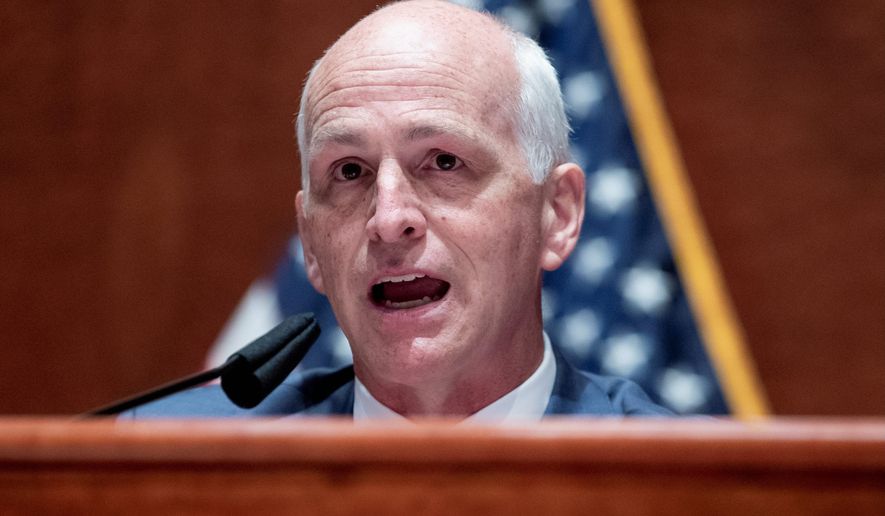House lawmakers from both parties have signed off on increased oversight of the Pentagon in the wake of the Afghanistan pullout, but partisan division emerged over the scope of the inquiry and Democrats stopped short of directly scrutinizing President Biden’s decisions.
The House Armed Services Committee approved the annual defense policy bill just days after the U.S. withdrew the last remaining troops from Afghanistan after two decades of war, leaving the country in the hands of the Taliban and more than 100 U.S. citizens left behind.
The top Republican on the committee, Rep. Mike Rogers of Alabama, turned the debate to the still-fresh wound of the chaotic pullout when the committee began a marathon voting session to finalize the bill, which is known as the National Defense Authorization Act.
“Today’s mark-up begins our duty to conduct oversight on the withdrawal from Afghanistan, but it cannot end here,” he said in his opening remarks. “We must find out what advice President Biden ignored in making these disastrous decisions.”
Mr. Rogers called for the administration to answer “exactly how many Americans President Biden left behind,” how much military equipment was turned over to the Taliban, and a plan to defeat terrorism in Afghanistan going forward.
He said there were “many more questions about what happened in Afghanistan that must be answered.”
House Armed Service Committee Chairman Adam Smith, Washington Democrat, said the committee’s inquiry would focus on the entire course of the 20-year war that Mr. Biden inherited.
“If we’re going to honestly look at Afghanistan, we need to look at all 20 years,” he said.
Committee members from both parties dotted the markup with measures imposing congressional oversight on security in the destabilized region going forward.
Early in the session, the panel adopted two measures proposed by Republican Reps. Liz Cheney of Wyoming and Elise Stefanik of New York would require the secretary of defense to submit a quarterly report outlining the threat posed by terrorist organizations in Taliban-controlled Afghanistan and quarterly briefings to Congress on military operations related to terror threats.
The committee also passed a measure by Rep. Jason Crow, Colorado Democrat, that would require the Pentagon to provide an annual assessment of its “over the horizon” counterterrorism capabilities. The “over the horizon” stance has been touted by the Defense Department as its solution to fight terrorism in the region without troops on the ground.
The Taliban takeover of the country raised questions about the strategy which assumed the U.S.-backed, democratically elected government in Afghanistan would remain in power and was heavily dependent on the Afghan security forces acting as an action arm.
Mr. Crow’s proposal would also require that the Pentagon report on its plans for evacuating U.S. citizens and Afghan allies with Special Immigrant Visa applicants.
The bill also includes inquires about the decision-making process ahead of the chaotic withdrawal, potentially signaling Democratic lawmakers’ appetite for posing tough questions to members of Mr. Biden’s Cabinet.
Rep. Vicky Hartzler, Missouri Republican, successfully forwarded two proposals that require the Pentagon to explain why it cut maintenance support to the Afghan Air Force and why the military left its strategic perch at Bagram Air Base in July.
The panel also adopted a measure by Ms. Cheney to establish a bipartisan “Commission on Afghanistan” which would “take a transparent look at what happened throughout the War in Afghanistan and examine the lessons that can be learned.”
“We have very different and strongly held views about the war, about what went right and what went wrong, but the nation deserves a transparent look at what happened and the lessons that we need to learn going forward,” Ms. Cheney said.
The panel’s Democrats, however, stopped short of direct shots at Mr. Biden over the debacle. They blocked an amendment by Rep. Michael Waltz, a Florida Republican and Army veteran of the Afghanistan War, that stated Congress had “lost confidence in President Biden’s ability to perform his duties as commander-in-chief of the United States Armed Forces.”
“Every one of my colleagues that have been so outraged night after night these past few weeks with scared Americans and allies, I hope that in the same vein they will express their outrage with this vote,” Mr. Waltz said. “This commander-in-chief has failed in leading this withdrawal.”
The measure was a bridge too far for Democrats on the panel who said it was politically motivated.
The measure died in a party-line vote.
• Joseph Clark can be reached at jclark@washingtontimes.com.




Please read our comment policy before commenting.